Knowledge system view
Page purpose: Provide a high level terrain view for thinking about the emerging world in which we are now embedded.
This world is complex and it is not static or linear—todayS aren’t a linear extrapolation of yesterdayS and tomorrowS won’t be an extrapolation of todayS.
Navigating these evolving worldS requires different expectations and an adequate work approach.
It also requires an adequate foundation for future directed decisions.
 Social ecologist Social ecologist
 Knowledge and learning are intertwined Knowledge and learning are intertwined

A combined strategic view:
- familiarity with events in the news is helpful in making the reality connection
- introductory comments
- the changing social and economic picture
- a static view of economic content and structure
- offerings—with a drill down to their strategic origins—and receptors (otherwise known as “customers”)
- specialized knowledge and knowledge workers
- the management revolution and its strategic function. Link to The Daily Drucker. Managing knowledge worker productivity.
- Post-Capitalist Society
- productivity of knowledge; knowledge workers; and service workers
- offerings and component technologies (knowledges)
- competing technology examples
- individual knowledge workers
- information challenges (nervous system for making knowledge and knowledges productive)
- what is knowledge?
- the linkages between knowledge, knowledge workers, information and other topics
- about change
- toward tomorrows
- the educated person
- change in knowledge
- TLN Synthesis
- Chief TLN Officer
To get the most out of the concepts on this page some preparation is extremely helpful—a reality connection. Part of that foundation can be acquired by looking at the themes and patterns in the news. My article list provides a convenient source.
You might want to set up a customized Internet start page—I use My Yahoo—or a RSS reader with equivalent subscriptions.
Introductory comments:
T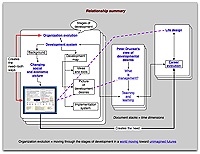 his page is a dimension of the changing social and economic picture and presents a static view of a system moving in time. The future of this system is unpredictable except to say that it will be different and different from what we now expect as well as what we may expect in the future—click image at the top of the page. It might be in your self-interest to ask: “What do I want to be (within the context of the system presented on this page) and what do I want (have) to do?” his page is a dimension of the changing social and economic picture and presents a static view of a system moving in time. The future of this system is unpredictable except to say that it will be different and different from what we now expect as well as what we may expect in the future—click image at the top of the page. It might be in your self-interest to ask: “What do I want to be (within the context of the system presented on this page) and what do I want (have) to do?”
One of the fundamental elements in this system is the mobility of knowledge workers, but that is beyond the scope of this page. Knowledge worker mobility is a dynamic and this page is mostly about structure visualization—focusing on what, not how.
Some of the symbols and text on the diagram below have links. You’ll need to mouse over them to locate the links (the mouse pointer will change when you hit a hot spot). Be sure to mouse over “Offering.” A list of these links is just below the diagram.

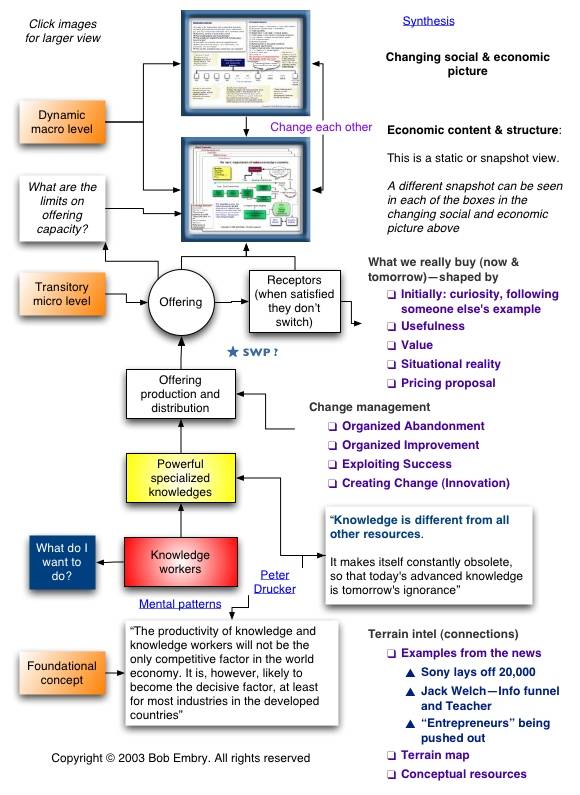
Knowledge :: Society of organizations :: Management
From Analysis to Perception — The New World View

There is a fundamental tension between the offering receptor’s desire to get it free and the producer’s need to bid for the resources required to produce the offering.
What are the organizations, knowledge structures, forms, or networks with the least amount of tension—tomorrow and the day after?
What work maps support this? Whose? What does the calendarization look like?
About management: what it does; what it is
The Daily Drucker
From Chapter 4, “What the Nonprofits are Teaching Business,” in The Essential Drucker:
Managing the knowledge worker for productivity is the next great challenge for American management. It requires
- a clear mission,
- careful placement and continual learning and teaching,
- management by objectives and self-control,
- high demands but corresponding responsibility, and accountability for performance and results
Participants in Peter Drucker’s program for middle and senior management say: “In my paying job there isn’t much challenge, not enough opportunity for achievement, not enough responsibility; and there is no mission, there is only expediency.”
Following is from Post-Capitalist Society by Peter Drucker
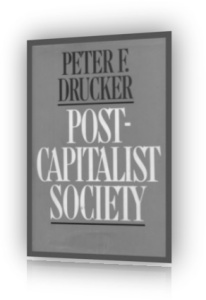
Amazon link: Post-Capitalist Society

“EVERY FEW HUNDRED YEARS in Western history there occurs a sharp transformation.
We cross what in an earlier book (The New Realities—1989) I called a “divide.”
Within a few short decades, society rearranges itself—its worldview; its basic values; its social and political structure; its arts; its key institutions.
(Can you identify what these components might be?)
(calendarize this?)
Fifty years later, there is a new world.
And the people born then cannot even imagine the world in which their grandparents lived and into which their own parents were born.
We are currently living through just such a transformation.”
The Limping Middle Class
“It is creating the post-capitalist society, which is the subject of this book.”

“That knowledge has become the resource,
rather than a resource,
is what makes our society “post-capitalist.”
This fact changes—fundamentally—the structure of society.
It creates new social and economic dynamics.
It creates new politics.
The post-capitalist society
is both a knowledge society and a society of organizations,
each dependent on the other and yet
each very different in its concepts, views, and values.
It is the very nature of knowledge
that it changes fast
and that today’s certainties
will be tomorrow’s absurdities.” — PFD

Chapter 3 — Labor, Capital, and Their Future
If knowledge is the resource of post-capitalist society, what then will be the future role and function of the two key resources of capitalist (and socialist) society, labor and capital?
Socially, the new challenges will predominate.
(to be discussed in Chapters 4 “The Productivity of the New Workforces” and 5 “The Responsibility Based Organization” and in the last part of this book — Knowledge: Its Economics and Its Productivity; The Accountable School; The Educated Person)
And the success of post-capitalist society will largely depend on our answers to them.
But politically, the unfinished business of capitalist society will be highly visible: the disappearance of labor as a factor of production, and the redefinition of the role and function of traditional capital.
We have moved already into an “employee society” where labor is no longer an asset.
We equally have moved into a “capitalism” without capitalists—which defies everything still considered self-evident truth, if not “the laws of nature,” by politicians, lawyers, economists, journalists, labor leaders, business leaders; in short, by most everybody regardless of political persuasion.
For that reason, these issues will be in the political spotlight in the decades ahead.
To be able to tackle successfully the new challenges of this transition period, we must resolve these two items of unfinished business: the future role and function of labor, and the future role and function of money capital.
See articles in the news for examples.

“THE NEW CHALLENGE facing the post-capitalist society is the productivity of knowledge workers and service workers.” (calendarize this?)
“To improve the productivity of knowledge workers will in fact require drastic changes in the structure of the organizations of post-capitalist society, and in the structure of society itself” (managing oneself).
“Even more drastic, indeed revolutionary, are the requirements for obtaining productivity from service workers”

Economic stagnation and severe social tension from
failure to raise knowledge and service worker productivity
Chapter 19 in Management, Revised Edition
Chapter 5 in Management Challenges for the 21st Century
Knowledge: Its Economics and Productivity

For clues to navigating toward tomorrowS … (calendarize these?)
 Management’s New Paradigm Management’s New Paradigm
 Management Challenges for the 21st Century Management Challenges for the 21st Century
 Managing In The Next Society Managing In The Next Society
The Next Society from the Economist
 From Analysis to Perception — The New Worldview From Analysis to Perception — The New Worldview
The question of the right size for a given task or a given organization will become a central challenge.
In an information-based society, bigness becomes a “function” and a dependent, rather than an independent, variable.
Increasingly, therefore, the question of the right size for a task will become a central one.
All of them are needed, but each for a different task and in a different ecology.
The right size will increasingly be whatever handles most effectively the information needed for task and function.
See Strategies and Structures in Management: Tasks, Responsibilities, Practices
“Knowledge executives who know how to allocate knowledge to productive use”
 Chapter 1, From Capitalism to Knowledge Society: The Management Revolution: “Supplying knowledge to find how existing knowledge can best be applied to produce results is, in effect, what we mean by management.” Chapter 1, From Capitalism to Knowledge Society: The Management Revolution: “Supplying knowledge to find how existing knowledge can best be applied to produce results is, in effect, what we mean by management.”
 Chapter 10, Knowledge: Its Economics and Its Productivity: The Management Requirements. Chapter 10, Knowledge: Its Economics and Its Productivity: The Management Requirements.
1) “aim high;
2) clearly focused (highly concentrated—purpose and organization);
3) systematic exploitation of opportunities for change—"Seven Windows of Innovation” matched to competences and strengths of knowledge worker and knowledge team;
4) managing time—balancing long term with short term”
See Only Connect …
What would the calendarization of this look like in your work and life?
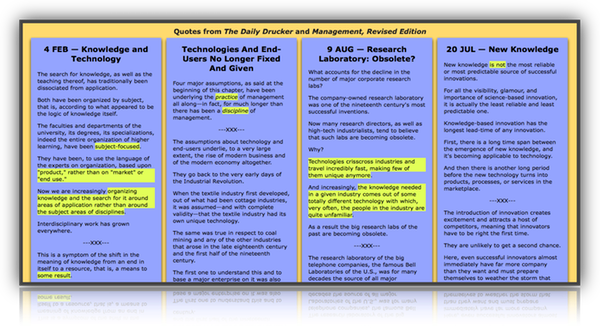
Larger
Offering example:

Component production, technologies, and knowledges at a point in time: (where else could these be applied?). Customers aren’t paying for these components. They pay for what the vehicle (the offering) does for them.

Competing technology examples
 TiVo competition TiVo competition
 Move Over 3G, Here Comes WiMAX Move Over 3G, Here Comes WiMAX
 Terrorists and knowledge for sale Terrorists and knowledge for sale
 Individual applications of knowledge that run counter to a healthy, functioning society Individual applications of knowledge that run counter to a healthy, functioning society
 Delphi example Delphi example
See Management’s New Paradigms > Technologies and End Uses Are Fixed and Given (NOT) in either The Essential Drucker (page 6) or Management Challenges for the 21st Century
Individuals (knowledge workers)
 Work life terrain view Work life terrain view
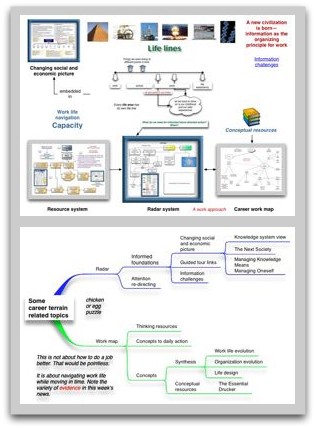
 Managing knowledge means managing oneself Managing knowledge means managing oneself
 Managing Oneself Managing Oneself
 Future of work? Future of work?
 Guided tour links Guided tour links
 Conceptual resources Conceptual resources
 Information challenges Information challenges
But what is knowledge?
See Chapter 1. “From Capitalism to Knowledge Society” in Post-Capitalist Society by Peter Drucker:
 The ability to do The ability to do
 The key personal and key economic resource. Knowledge is the only meaningful resource today. Other factors of production have become secondary. The key personal and key economic resource. Knowledge is the only meaningful resource today. Other factors of production have become secondary.
 And knowledge in this new sense means knowledge as a utility, knowledge as the means to obtain social and economic results And knowledge in this new sense means knowledge as a utility, knowledge as the means to obtain social and economic results
Index entries from Post-Capitalist Society by Peter Drucker
Knowledge
- advancement of, 46
- application of, 28-29
- and capital, 66, 82
- and capitalism, 19
- and class, 27n
- and community, 173
- and concentration, 191
- and continuing improvement, 185
- economics of, 20, 42, 181-93
- and the educated person, 215
- and employees, 186
- as equally valuable, 217-18
- and exploitation, 185
- and fiscal policy, 166
- general, 45
- and GNP, 186
- history of, 34n
- impact of, 46-47
- importance of, 193
- and the Industrial Revolution, 19, 27-32,45
- and innovation, 8, 42, 58-59, 183-84, 185, 190, 191
- and knowledges, 45-47
- and labor, 71,73
- and liberal education, 46
- and management, 20, 40-45, 193
- meaning of, 24-27
- as the means of production, 8
- and organizations, 49-50, 57-58
- as personal, 210
- and power, 47
- prediction about, 218
- process, 201-4
- production of, 182, 185
- productivity of, 8, 20, 32-40, 45, 50, 186-88,192-93
- purpose of, 45
- quantification of, 185-86
- and regionalism, 151-52
- as a resource, 4, 6, 19, 42, 44-45
- and responsibility, 174
- and self-knowledge, 26, 27, 45, 46
- and the shift to the knowledge society, 8
- and skill (techne), 27, 46
- and social change, 57-58
- and specialization, 45-47, 50, 193
- and the “super-rich,” 182
- and technology, 187-88, 190, 191
- types of, 185
- as a utility, 42
- and what is known, 192-93
- See also Educated person; Knowledge society; Knowledge work; Knowledge workers; Schools
Knowledge workers
- and class, 6, 95-96
- as employees, 64-65
- and income, 84
- and innovation, 191
- as the leading social group, 8
- loss of jobs by, 65-66
- and machines, 64-65, 85
- and the means of production, 8, 64, 66, 67
- and organizations, 8, 56, 64
- as owners of knowledge, 8
- and productivity, 83-96
- and the shift to the knowledge society, 6
- social investment in, 64
- social life of, 174
- supervision of, 65
- and teams, 85-90
- and tools of production, 8, 64-65, 66
Information
- and banking, 183
- and capitalism, 182, 183
- and command and control, 106-7
- and communism, 143-44
- and corporations, 89
- and cultural identity, 145
- and democracy, 143
- distortion of, 144
- and the economy, 181, 183
- and management, 107
- and the nation-state, 143-45
- and national sovereignty, 144
- and organizations, 93, 106-9
- production of, 182
- and responsibility, 106-9
- and the “super-rich,” 182
- and teams, 88-89
- and technology, 89, 144
- and totalitarianism, 143, 144
- and transnationalism, 143-45, 153-54
- and tribalism, 153-54
Wikipedia, Encyclopedia Britannica, Dictionary, Google search
Toward tomorrows

Toward unimagined futures
 The End of Economic Man: The Origins of Totalitarianism (1939) There’s still lots to learn here !!!! The End of Economic Man: The Origins of Totalitarianism (1939) There’s still lots to learn here !!!!
 The Future of Industrial Man (1943) The Future of Industrial Man (1943)
 The New Society: The Anatomy of Industrial Order (1950) The New Society: The Anatomy of Industrial Order (1950)
 Landmarks of Tomorrow (1957) Landmarks of Tomorrow (1957)
 The Age of Discontinuity (1968) The Age of Discontinuity (1968)
 The New Realities (1988) The New Realities (1988)
 Post-Capitalist Society (1993) Post-Capitalist Society (1993)
Moving beyond Capitalism
 Management Challenges for the 21st Century (1999) Management Challenges for the 21st Century (1999)
 Managing in the Next Society (2002); Last section originally published earlier in The Economist (http://economist.com/surveys/displaystory.cfm?story_id=770819) Managing in the Next Society (2002); Last section originally published earlier in The Economist (http://economist.com/surveys/displaystory.cfm?story_id=770819)
Drucker passed away in 2005
The Educated Person
From Chapter 12, Post-Capitalist Society by Peter Drucker
In all earlier societies, the educated person was an ornament. He or she embodied Kultur—the German term which in its mixture of awe and derision is untranslatable into English (even “highbrow” does not come close). But in the knowledge society, the educated person is society’s emblem; society’s symbol; society’s standard bearer. The educated person is the social “archetype"—to use the sociologist’s term. He or she defines society’s performance capacity. But he or she also embodies society’s values, beliefs, commitments. If the feudal knight was the clearest embodiment of society in the early Middle Ages, and the “bourgeois” under Capitalism, the educated person will represent society in the post-capitalist society in which knowledge has become the central resource. This must change the very meaning of “educated person.” It must change the very meaning of what it means to be educated. It will thus predictably make the definition of an “educated person” a crucial issue. With knowledge becoming the key resource, the educated person faces new demands, new challenges, new responsibilities. The educated person now matters.
… snip snip …
But one thing we can predict: the greatest change will be the change in knowledge—in its form and content; in its meaning; in its responsibility; and in what it means to be an educated person.
TLN Synthesis (work life evolution; organization evolution; …)
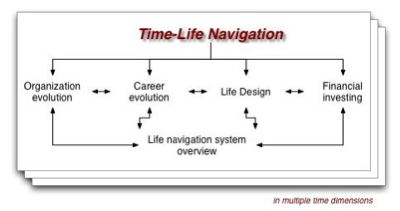
Chief TLN Officer and Peter Drucker on Leadership
X-economy
New thinking about thinking
Marketing and Innovation in a society moving in time
Marketing Management: Analysis, planning, implementation, & control
Entrepreneurship and Innovation
Innovation & Entrepreneurship (by Peter Drucker)
Work sequence embedded in a LNS: Interest profile > Work map > Concepts to daily action
later
Further exploration into the world of knowledge:
Also see bobembry’s bookmarks on del.icio.us
CONNECTIONS: Intel map part of an exploration blueprint. Other related: Life-TIME investment system introduction
|
![]()

![]()